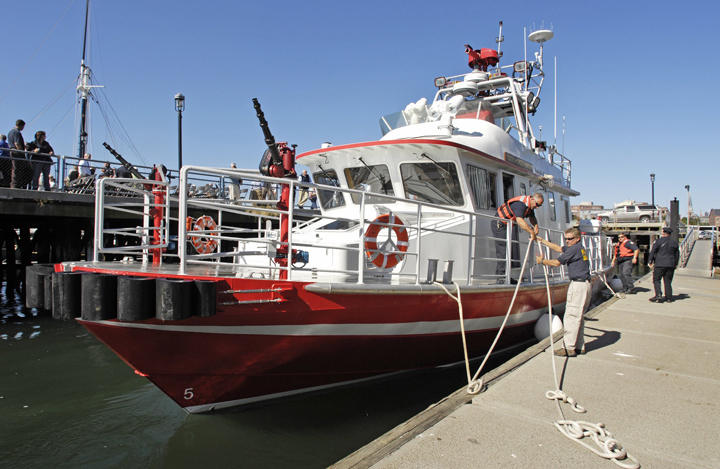Three years after running the city’s $3.2 million fireboat into a well-known underwater shipwreck in Portland Harbor, members of the Portland Fire Department’s Marine Division have completed a new training program to help them better navigate the large vessel.
The beefed up training program follows two high-profile and costly navigation accidents involving the 65-foot City of Portland IV since it was purchased in 2009, and marks a policy reversal for the city. Officials had previously defended the training program they had before the accidents.
The 16-member fireboat crew was trained during two sessions – in June and November – to the U.S. Coast Guard’s standards for operating 100-ton vessels.
“We’ve made massive improvements,” said Fire Chief Jerome LaMoria. “We’ve gotten ourselves to a standard of where we need to be. From this point forward, it’s maintaining that capability.”
LaMoria, who was hired after the fireboat accidents, said the training also included five firefighters from South Portland, which helped pay the $19,200 overall training cost.
Fire Chief Kevin Guimond said South Portland recently acquired a 24-foot rescue boat and wanted to establish a training program. The $74,000 cost of the boat was covered by a federal port security grant, he said.
Portland’s fireboat crew came under scrutiny after two accidents that together caused more than $140,000 in damage to the boat.
The vessel ran aground near Peaks Island during a rescue call in November 2009, sustaining $90,000 worth of damage just two months after it was put into service.
In 2011, the fireboat struck the shipwreck, which is marked on nautical maps, while passing Fort Gorges, causing more than $50,000 in damage during what the city has described as a “navigational training” run.
However, a city investigation revealed that 12 civilian passengers were on board when the boat left the dock shortly before sunset on Saturday, Oct. 15. The crew did not properly follow navigational aids, and the boat was traveling at a high speed – 14 knots – when it left the channel and stuck the wreck.
Two crew members were disciplined, and the city tightened up policies for using the fireboat and bringing civilians aboard.
LaMoria said trainees had 56 hours of training in late May and early June to receive what is called a “six-pack” license, which allows vessels that are not inspected by the U.S. Coast Guard to carry as many as six paying passengers. In November, the crew received an additional 24 hours of training and completed an exam to upgrade that license to cover operating a 100-ton vessel, he said.
The training consisted of classroom and hands-on components, including plotting navigational courses both digitally and on paper, said LaMoria. No overtime was incurred during the training, he said.
Historically, crew members were trained by more experienced boat pilots within the department who had Coast Guard licenses.
After Marine Safety Consultants reviewed the existing training program in 2011, then-City Manager Mark Rees said the city would make no changes and that Coast Guard training was “not really applicable” to the department’s needs.
But LaMoria said Tuesday that the previous training model led to inconsistencies and that a conversation in February with the city’s insurer, the Maine Municipal Association, led the city to hire an outside trainer.
“For the first time in history, everybody got the same message. Everybody got the same instruction,” LaMoria said. “What it did was break down some of the challenges and differences and the nuances between the shifts. I think that was really important.”
More important, LaMoria said, a better training program was something the department’s marine division wanted following the public backlash from two costly accidents.
“I think that their experience in the aftermath of the fireboat incident, it grew on them,” said LaMoria, who made restoring public trust a priority when he took over the department in 2012. “And it was my focus. This is something the people that operate this vessel should have. I felt that personally.”
Greg Metcalf owns Kennebunkport’s Atlantic Captain’s Academy, which conducted the training sessions. A licensed captain since 1983 and an instructor since 2007, Metcalf said he conducts year-round training for all types of mariners throughout the U.S. In 2011, he helped train an environmental clean-up crew in the Gulf of Mexico following the BP oil spill, he said.
Metcalf said he was apprehensive about training Portland firefighters, partly because of the high profile accidents. But he was pleasantly surprised.
“I didn’t know how they would take to an outsider coming in, but they did great,” Metcalf said. “They embraced the challenge. They’re in good shape now.”
LaMoria said the training, along with a newly renovated crew quarters in the Casco Bay Lines parking garage and staffing adjustments that ensures a three-member fireboat crew at all times, have helped the Marine Division turn a corner.
“The pride has turned around,” LaMoria said. “They’re no longer sleeping in a broom closet and they’ve been trained to a new level. It’s like the city took care of them.”
Send questions/comments to the editors.




Success. Please wait for the page to reload. If the page does not reload within 5 seconds, please refresh the page.
Enter your email and password to access comments.
Hi, to comment on stories you must . This profile is in addition to your subscription and website login.
Already have a commenting profile? .
Invalid username/password.
Please check your email to confirm and complete your registration.
Only subscribers are eligible to post comments. Please subscribe or login first for digital access. Here’s why.
Use the form below to reset your password. When you've submitted your account email, we will send an email with a reset code.